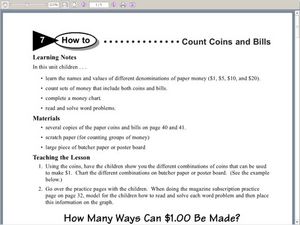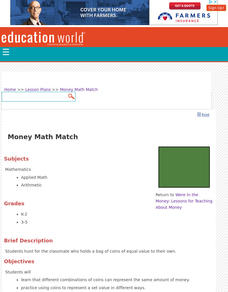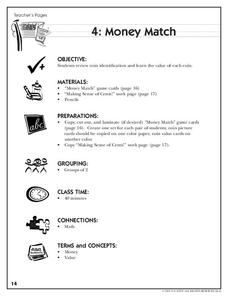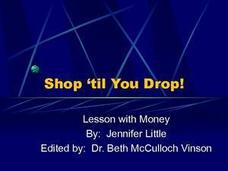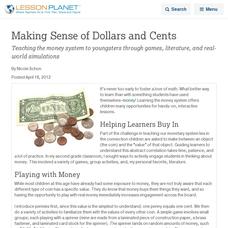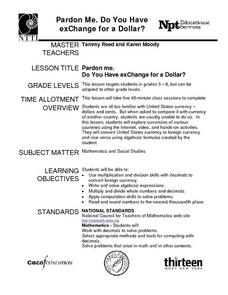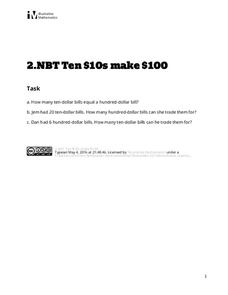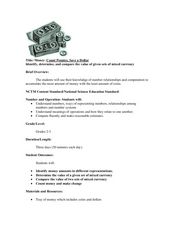Curated OER
Casting Coins
This wonderful art instructional activity invites students to design and “mint” coins bearing their own symbols. A simple carving andcasting process using Blick Wonder-Cut®linoleum and modeling clay is described in the plan. Coins can be...
Curated OER
Count Coins and Bills
Lower graders recognize coins and paper money and understand its value. They participate in a variety of money problems to appreciate the value of money. Students add, subtract, chart and solve money problems.
Curated OER
Money Math Match
Learners hunt for the classmate who holds a bag of coins equal in value to theirs, study that different combinations of coins can represent the same amount of money and practice using coins to represent a set value in different ways.
Curated OER
Identifying Coins and Their Value
Use the special Tennessee State Quarter as a learning tool. During this lesson plan, discuss why the Tennessee Quarter has musical instruments on it. You can also utilize a worksheet embedded in the plan to help your class compose a song...
Curated OER
Stamping Coins
Learners demonstrate that they can use a variety of coin combinations to make a single amount. They study all the ways to make 50 cents using coins using different coins.
Curated OER
Money Match
Playing a game can be educational, pupils use this matching activity to identify coins and their values. This is a great way to have learners practice their money sense.
Curated OER
Money
Which coins do you need? Scholars are faced with a challenge: using only three coins they must find the exact amount needed for six items. The coins are standard US currency and are pictured at the top, however their value is not listed....
Curated OER
Money - Using R & R to Teach Mathematics
Second graders count up coins of money that add up to one dollar. In this money lesson plan, 2nd graders also spend money and keep track of how much they have spent.
Curated OER
Counting Money and Making Change
Students count collections of coins and one-dollar bills. They solve problems and learn to use the dollar sign ($) with the decimal point to represent money amounts. This lesson is important as a foundation for future math concepts in...
Curated OER
Show Me The Money
Third graders explore the value of U.S. money. In this money lesson plan, 3rd graders print out pictures of money from the Internet and create play money. The students will play a game in which they display the amount of money called out...
Curated OER
Shop till You Drop! Working with Money
Paper and coin currency are shown and reviewed, and then used to apply consumer math skills. Learners are given two examples of how they should line up decimal points and place values when adding or subtracting money. They watch as the...
Curated OER
Currency and the Fed
Students take a closer look at money. In this federal reserve lesson, students complete the provided handouts that require them to examine Federal reserve notes and discover details about the role of the Federal Reserve in the United...
EngageNY
Using Expected Values to Compare Strategies
Discover how mathematics can be useful in comparing strategies. Scholars develop probability distributions for situations and calculate expected value. They use their results to identify the best strategy for the situation.
Curated OER
Saving Money
After listening to the wonderful book, A Chair for my Mother, young mathematicians engage in an awesome lesson about coins and the value of saving money. The lesson is done in a classic style - everything is beautifully organized, and...
Curated OER
Making Sense of Dollars and Cents
Teaching the money system to youngsters through games, literature, and real-world simulations
Curated OER
The Role of Money
Fourth graders examine the role of money. In this money lesson, 4th graders read a chapter from Judy Blume's, Double Fudge, to see how money is made and how people make money. They finish a worksheet, and play a game about money.
Curated OER
Comparing Values: Comparisons Between Musical Notation and Money
Students identify ways in which the principles and subject matter of other disciplines taught in school, specifically math, are interrelated with those of music.
Curated OER
Pardon Me. Do You Have Change For a Dollar?
Upper elementary and middle school learners explore currencies from a variety of countries. They use the Internet, video, and engage in hands-on activities. They practice converting U.S. currency to foreign currency and vice versa. This...
Curated OER
Quarter, Nickel, Dime....
An engaging game called, "Quarter, Nickel, and Dime" is presented in this math lesson. Players are given an envelope with slips of paper that represent the three coins. In pairs, they play the game 18 times, and the whole class charts...
Curated OER
Slowly But Surely
The US mint has created this fabulous lesson plan, which practices language arts and mathematics skills. Learners will use the provided worksheets and step-by-step instructions to experiment with different sentence structures, use...
Illustrative Mathematics
Ten $10s Make $100
If ten $10s make $100, then how much money do twenty $10s make? Young bankers find the number of bills required to make base ten amounts in three different word problems.
Curated OER
Money: Count Pennies, Save a Dollar
Students determine how to make the largest sum of money using the least amount of coins. In this mixed currency lesson, students listen to a reading of If You Made a Million by David M. Schwartz before participating in money counting...
Visa
What is Money?
Students identify the names of coins and grasp their relative values in terms of purchasing power. They engage in activities and games that help them acquire this knowledge.
Curated OER
A Lesson to Accompany "Benjamin Franklin and the Birth of a Paper Money Economy"
Students examine the role of money in the colonial economy by participating in a trading activity. In this colonial economy instructional activity, students complete an activity to learn about colonial trade and what happens when there...



